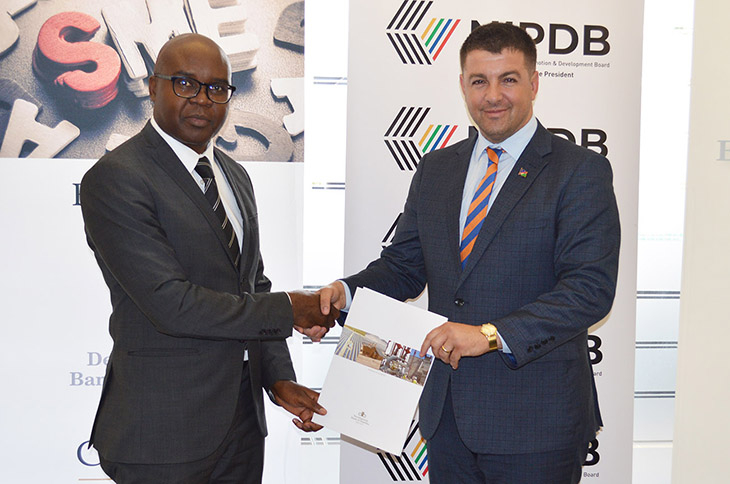Development Bank of Namibia (DBN) and the Namibia Investment Promotion Board (NIPDB) have formalized their cooperation with a memorandum of understanding (MoU) signed on 28 September 2022. The two development agencies have previously cooperated in the past, notably when DBN accompanied the NIPDB Know2Grow outreach programme, during which DBN introduced its products to SMEs in 26 towns.
Speaking about the need for cooperation, DBN CEO, Martin Inkumbi, said the Bank is a financing agency that is dependent on demand from potential borrowers. Although DBN promotes its finance and associated services, promotion of economic participation through enterprise activity is the specialist field of NIPDB.
The MoU, which focuses on SMEs, harnesses the capacity of both agencies to further develop the SME sector.
Speaking about the need for inter-agency cooperation, Inkumbi said there are multiple initiatives to develop enterprise, but these initiatives often replicate the work performed by others. This leads to replication of work and potential mixed messages. By combining forces and seeking synergies through cooperating agencies, economic policy can be executed more efficiently.
He cited for example, DBN’s implementation of the Credit Guarantee Scheme (CGS) which provides a collateral guarantee of 60% to SMEs seeking finance from participating commercial banks. He also mentioned a recent agreement with the Namibia Trade Forum (NTF) in terms of which Namibian enterprises will be assisted to further develop their products and services to prepare them for the market.
Dino Ballotti, NIPDB Executive Director responsible for MSME Development, Innovation and Acceleration, said the largest contributors to economic activity in successful economies across the world are Micro, Small and Medium Enterprises, and there is no difference to that of Namibia. MSMEs play a significant role in our financial development, yet they face real challenges in the form of lack of information and financial support.
Evidence demonstrates the scale and commercialization of the sector can be achieved through the development of smart partnerships, such as this one, which will further drive the MSME agenda and ensure that no one is left behind. Access to information and innovative practices that can scale enterprises remains fundamental where the excellent work of the Development Bank will only enhance the efforts of an inclusive, more competitive business environment.
Although Development Bank’s minimum loan amount is N$150,000 for registered enterprises- or N$50,000 for young professionals and artisans, it provides apex microfinance for on-lenders who provide enterprise loans in smaller amounts.
 DBN CEO Martin Inkumbi, and Dino Ballotti, NIPDB Executive Director responsible for MSME Development, sign a landmark agreement to cooperate on providing an enabling environment for SMEs.
DBN CEO Martin Inkumbi, and Dino Ballotti, NIPDB Executive Director responsible for MSME Development, sign a landmark agreement to cooperate on providing an enabling environment for SMEs.



